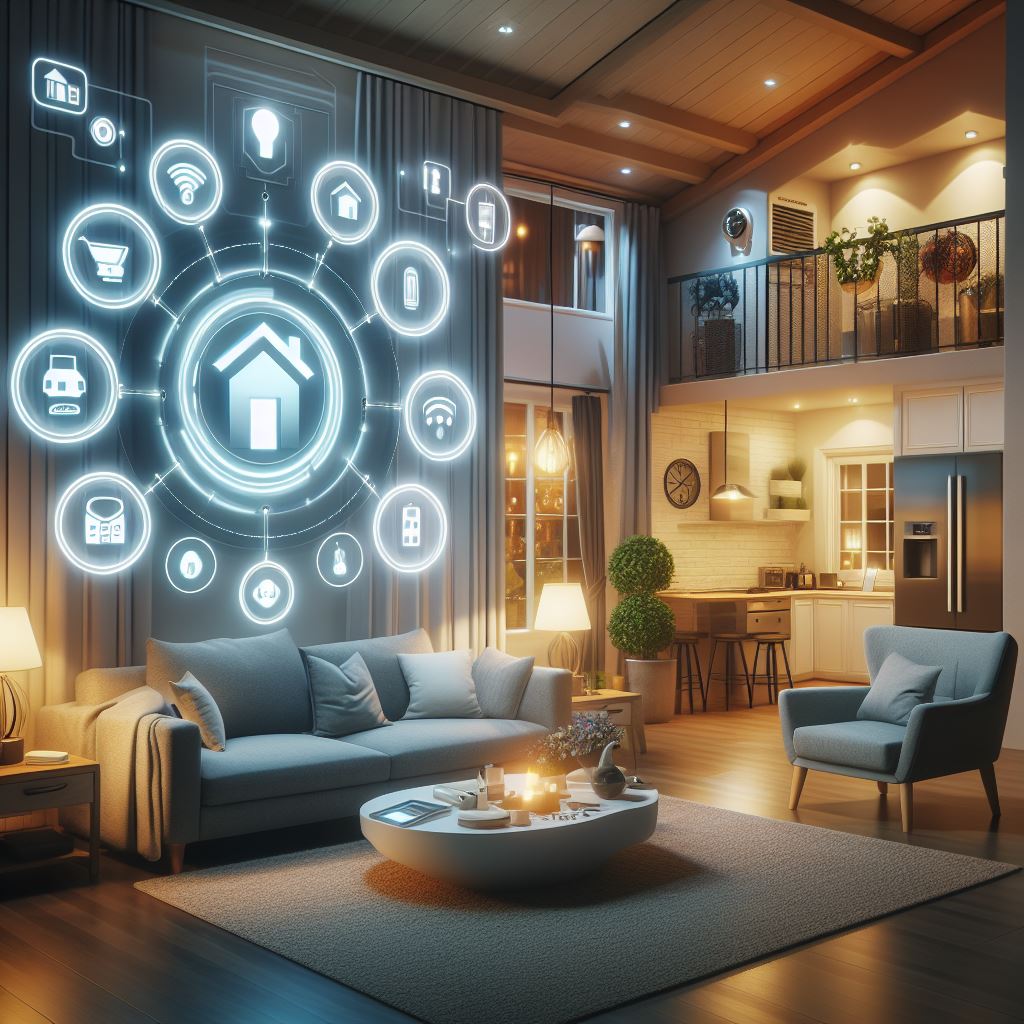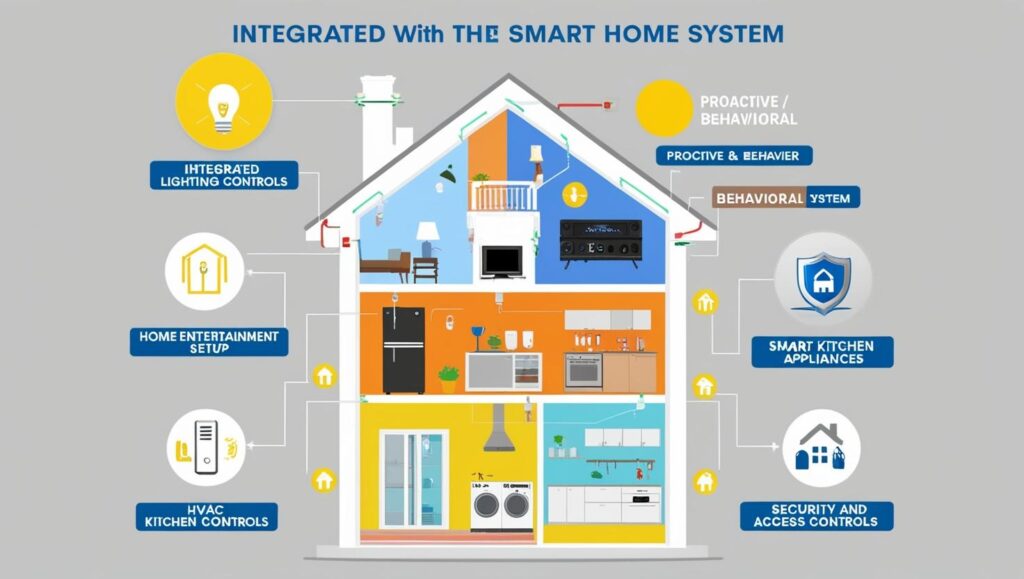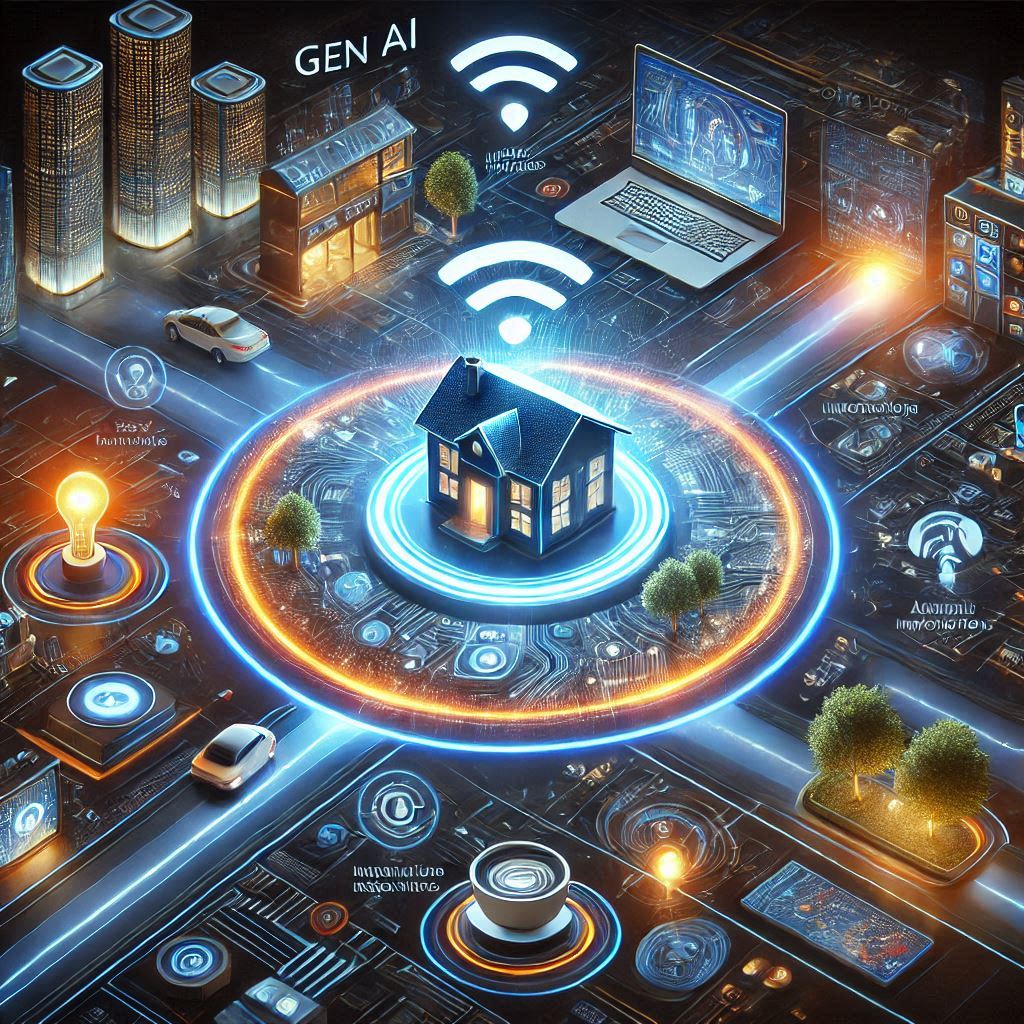The concept of smart homes has transitioned from being a futuristic ideal to a mainstream reality. With the rapid advancement of Artificial Intelligence (AI) smart homes are becoming increasingly intuitive, adaptable, and capable of offering more personalized and efficient living experiences. AI is at the core of this transformation, providing innovative solutions that make daily tasks easier, safer, and more energy-efficient. From voice assistants to predictive automation, AI is redefining how we interact with our living spaces.
What is AI in Smart Homes?
AI in smart homes refers to the application of machine learning algorithms, data analytics, and natural language processing (NLP) to control and optimize various systems within a home. AI enables devices to “learn” from user behavior, anticipate needs, and make decisions without requiring constant input from the homeowner. This technological evolution allows for enhanced automation, seamless integration of devices, and improved overall home efficiency.
Key AI Technologies Transforming the Smart Home Industry
AI’s role in the smart home industry is vast, with several key technologies driving its growth and success. Below are some of the most impactful ways in which AI is transforming the way we live:
1. Voice Assistants: AI at the Heart of Smart Communication
Voice-activated AI assistants like Amazon Alexa, Google Assistant, and Apple Siri have become central to the smart home ecosystem. These AI-driven assistants allow users to control smart home devices with simple voice commands. Whether it’s adjusting the thermostat, turning off the lights, playing music, or setting reminders, AI voice assistants create a seamless and hands-free experience.
The real magic lies in the ability of these voice assistants to understand and learn from user preferences. As AI processes more interactions, it fine-tunes its responses, offering more relevant suggestions and becoming increasingly adept at handling more complex tasks.
2. Smart Lighting and Energy Management: Enhancing Comfort and Efficiency
AI-powered lighting systems adapt to the lifestyle of the homeowner. For example, smart lighting systems powered by AI can adjust brightness, color temperature, and even turn lights on or off based on time of day, occupancy, and user preferences. Over time, the system learns the household’s patterns and begins to optimize lighting automatically, providing comfort while saving energy.
Energy management is another critical area where AI excels. AI-based smart thermostats (like Nest) use machine learning to analyze a user’s schedule and preferences, adjusting the temperature based on when the homeowner is present or away. This helps conserve energy, reduce utility bills, and ensure that homes remain at the perfect temperature, all while using less energy.
3. Smart Security Systems: AI for Enhanced Home Protection
Security is one of the primary concerns for homeowners, and AI-powered systems are improving safety in ways previously unimaginable. AI-based cameras and motion detectors can recognize faces, differentiate between familiar and unfamiliar faces, and provide real-time alerts about potential intruders. These systems learn over time, becoming more accurate and reliable as they process data.
Furthermore, AI can integrate with other smart devices like locks and doorbells to provide end-to-end security solutions. Smart locks powered by AI recognize user behaviors and automatically adjust security settings based on who is at the door. In addition, AI-driven systems can send notifications to homeowners if suspicious activity is detected, giving peace of mind when away from home.
Download PDF Brochure @ https://www.marketsandmarkets.com/pdfdownloadNew.asp?id=121

4. Predictive Automation: Anticipating User Needs
One of the most exciting applications of AI in smart homes is predictive automation. By learning a homeowner’s habits, preferences, and routines, AI systems can anticipate needs and automatically adjust settings accordingly. For example, if an AI system learns that a homeowner prefers to have their lights dimmed and the air conditioning set to a certain temperature when watching TV, it can automatically implement these changes without the need for manual adjustments.
Predictive automation extends to other aspects of smart homes, such as grocery shopping, where AI can track inventory levels and automatically order supplies when they’re running low, or even help plan meals based on user preferences.
5. Health and Wellness: AI for Improved Quality of Life
AI is also making significant strides in the health and wellness space within smart homes. Smart beds that adjust positions based on sleep patterns, AI-powered air purifiers that monitor air quality, and smart health monitors that track vitals in real-time are just a few examples of how AI is contributing to a healthier living environment.
Some advanced AI systems also integrate wellness features such as smart lighting that mimics natural daylight to regulate circadian rhythms, sleep trackers, and AI-powered reminders for hydration, exercise, and medication management. The goal is to create a healthier, more balanced lifestyle for homeowners through intelligent, data-driven insights.
6. Smart Appliances: Automating Everyday Tasks
AI is revolutionizing traditional household appliances, transforming them into smart devices capable of learning and adapting to users’ needs. From smart refrigerators that track inventory and suggest recipes to AI-powered washing machines that optimize washing cycles based on load types, AI is making daily chores more convenient and efficient.
For instance, an AI-powered refrigerator can notify homeowners when groceries are running low or even order food online. Likewise, AI-powered ovens can recognize the type of food being cooked and adjust cooking times and temperatures for the best results. These appliances not only save time but also offer energy-efficient options to reduce electricity consumption.
7. AI for Smart Home Integration and Control
AI serves as the connective tissue between various devices and ecosystems within a smart home. With the help of AI hubs or central control systems, homeowners can easily manage multiple smart devices from different manufacturers. These AI hubs learn user preferences and provide a unified, streamlined experience across various devices—from lighting and security to entertainment and health monitoring.
With voice commands, mobile apps, or even gestures, users can seamlessly interact with multiple devices, making the smart home more intuitive and accessible than ever before.

The Future of AI in Smart Homes
The integration of AI in smart homes is still in its early stages, with vast potential for future innovation. As AI algorithms continue to evolve, smart homes will become more proactive, responsive, and personalized. Some key trends to look out for include:
Greater Interoperability: Expect smoother integrations between different smart devices, creating a more cohesive and seamless experience for users.
Improved AI Decision-Making: AI will evolve to make even more accurate predictions about user preferences and home needs, driving smarter automation.
Enhanced Data Privacy and Security: As smart homes collect vast amounts of data, security and privacy will become top priorities, prompting advancements in data encryption and AI-based security solutions.
AI-Powered Sustainability: AI will help homeowners make more sustainable choices, reducing energy consumption and waste, while promoting eco-friendly living.
AI is not just enhancing the way we interact with our homes—it’s transforming the entire concept of smart living. By leveraging AI technologies like voice assistants, predictive automation, and intelligent security, smart homes are becoming more efficient, personalized, and secure. As AI continues to evolve, we can expect even greater advancements, with AI-driven homes becoming more attuned to our daily routines and needs. The future of smart homes is bright, and AI is at the heart of this exciting revolution.
Competitive Landscape of the AI in Smart Home Industry
The AI-powered smart home industry is experiencing rapid growth, with numerous players across technology, hardware, and software sectors working to enhance innovation and meet consumer demands. Companies are continually introducing new solutions that blend cutting-edge AI technologies with practical applications for home automation, security, energy efficiency, and overall convenience. The competitive landscape is shaped by global technology giants, established home automation firms, startups, and tech innovators. Here’s an overview of the key players in the AI smart home industry and the dynamics shaping the market.
1. Major Technology Giants
Amazon
Amazon, with its Alexa ecosystem, continues to dominate the AI-powered smart home space. Alexa serves as the backbone of a wide range of smart devices, from smart speakers to thermostats and lighting systems. Amazon’s strategy involves extensive partnerships with other smart home manufacturers and continuous improvements in Alexa’s voice recognition and AI-powered automation capabilities. Alexa’s growing market presence has set a high bar for competitors in terms of natural language processing, seamless device integration, and AI-driven user personalization.
Google
Google, through its Google Assistant and smart home ecosystem (Nest, Google Home), is a formidable player in the market. Google’s AI prowess, specifically in machine learning and natural language understanding, gives its smart home solutions an edge in real-time voice interactions, predictive automation, and personalization. The integration with Google’s other services, such as search, maps, and Gmail, further enhances the functionality and adaptability of its smart home products. The company’s focus on AI-powered automation and smart home integration puts it in close competition with Amazon.
Apple
Apple’s HomeKit platform leverages AI to control and automate smart home devices across the Apple ecosystem, including Siri, iPhone, iPad, and Apple Watch. Apple’s emphasis on privacy and security has gained considerable attention, positioning it as a trusted choice for users who value secure and reliable smart home technology. Apple’s tight integration of hardware, software, and services gives it an edge in ensuring smooth interactions between devices, making it a competitor to both Amazon and Google.
2. Home Automation Leaders
Samsung
Samsung, through its SmartThings platform, is a major player in the AI smart home market. By focusing on device interoperability, Samsung offers an integrated ecosystem that connects various smart devices from different manufacturers. Samsung’s AI-powered home automation system learns user preferences and schedules to make predictions about home environments, such as adjusting lighting, temperature, or security features. Samsung’s strong presence in consumer electronics and appliances strengthens its position in the smart home sector.
Philips Hue
Philips, with its Hue smart lighting, is a leader in AI-powered lighting systems. The company’s lighting solutions are equipped with AI to automate settings, such as brightness and color temperature, based on user habits and environmental conditions. The Philips Hue system integrates seamlessly with major smart home platforms like Amazon Alexa, Google Assistant, and Apple HomeKit. Philips’ focus on energy-efficient lighting solutions combined with AI-driven personalization makes it a leader in the smart lighting niche.

3. Emerging Startups and Innovators
Ecobee
Ecobee, a leader in AI-powered smart thermostats, focuses on energy efficiency and user-centric automation. With the integration of AI, Ecobee’s thermostats not only adjust the temperature based on user routines but also optimize for energy savings and comfort. Ecobee’s AI capabilities allow its devices to learn user preferences and adapt intelligently, driving significant energy savings while improving the user experience. The company’s integration with voice assistants like Alexa and Google Assistant further boosts its competitive edge.
August Home
August Home is a key player in AI-powered smart security and smart locks. The company’s smart locks use AI to recognize users and control access, allowing homeowners to monitor and manage their front doors remotely. With real-time alerts and voice assistant integration, August Home offers a robust security solution powered by AI to enhance home protection and convenience.
Ring (an Amazon Company)
Ring has revolutionized home security with AI-powered video doorbells and security cameras. Using advanced AI algorithms, Ring’s cameras can detect human motion, differentiate between objects, and send real-time alerts to users. Additionally, Ring’s integration with Alexa offers enhanced automation and voice-controlled security features. Ring’s continued focus on AI-driven surveillance solutions positions it as a leading competitor in the home security sector.
4. AI-Driven Solutions Providers
Neura
Neura is a pioneer in AI-driven personalization for the smart home industry. By focusing on contextual AI, Neura develops solutions that can predict and optimize user experiences in the home. The company’s technology learns about the user’s preferences, habits, and routines to offer predictive automation, allowing for more seamless and personalized interactions with smart home devices. Neura’s AI algorithms enhance the smart home’s ability to adapt to different family members, activities, and environments.
Control4
Control4 focuses on providing high-quality, AI-integrated home automation systems that offer complete control over smart home devices. The company’s AI-powered automation platform helps homeowners control lighting, entertainment systems, security, climate, and other aspects of their home seamlessly. Control4’s offerings target both residential and commercial markets, expanding its reach and establishing its presence as a competitor in high-end smart home installations.
5. Strategic Partnerships and Collaborations
The competitive landscape of AI in smart homes is also shaped by partnerships and collaborations between key players in the technology and manufacturing industries. For instance, Amazon and Google have established relationships with a variety of third-party smart home device manufacturers, such as LIFX, Sonos, and Samsung, to ensure compatibility with their AI-powered systems. These alliances help expand the availability of AI-powered devices and foster a more interconnected smart home ecosystem.
Furthermore, companies are also working with AI-focused research institutions and startup accelerators to drive innovation in the industry. Collaboration with leading AI researchers helps companies refine algorithms, optimize device integration, and improve predictive automation capabilities.
Market Challenges and Opportunities
The global smart home industry was valued at USD 84.5 billion in 2024 and is projected to reach USD 116.4 billion by 2029; While the AI-powered smart home market is full of potential, it also faces challenges such as interoperability issues among different devices, data privacy concerns, and the high cost of advanced technologies. As AI evolves, consumers demand systems that work seamlessly across brands and devices, requiring improved standards of interoperability. Data privacy concerns also continue to be a critical issue, with consumers increasingly wary of how their personal data is collected, shared, and used by AI systems.
However, these challenges present opportunities for new companies and existing players to innovate further. Companies that can offer secure, interoperable, and cost-effective AI-driven smart home solutions will be well-positioned to lead the market.
About MarketsandMarkets™
MarketsandMarkets™ is a blue ocean alternative in growth consulting and program management, leveraging a man-machine offering to drive supernormal growth for progressive organizations in the B2B space. We have the widest lens on emerging technologies, making us proficient in co-creating supernormal growth for clients.
The B2B economy is witnessing the emergence of $25 trillion of new revenue streams that are substituting existing revenue streams in this decade alone. We work with clients on growth programs, helping them monetize this $25 trillion opportunity through our service lines – TAM Expansion, Go-to-Market (GTM) Strategy to Execution, Market Share Gain, Account Enablement, and Thought Leadership Marketing.
Built on the ’GIVE Growth’ principle, we work with several Forbes Global 2000 B2B companies – helping them stay relevant in a disruptive ecosystem. Our insights and strategies are molded by our industry experts, cutting-edge AI-powered Market Intelligence Cloud, and years of research. The KnowledgeStore™ (our Market Intelligence Cloud) integrates our research, facilitates an analysis of interconnections through a set of applications, helping clients look at the entire ecosystem and understand the revenue shifts happening in their industry.
To find out more, visit www.MarketsandMarkets™.com or follow us on Twitter, LinkedIn and Facebook.
Contact:
Mr. Rohan Salgarkar
MarketsandMarkets™ INC.
1615 South Congress Ave.
Suite 103
Delray Beach, FL 33445
USA : 1-888-600-6441